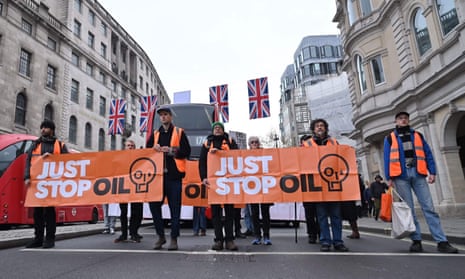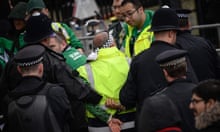Suella Braverman is to give police the power to ban slow walking in traffic by protesters, as Just Stop Oil enters the fifth consecutive day of using the tactic in the latest phase of its climate protest campaign.
The home secretary said a statutory instrument to the public order bill, which passed its final stages in parliament on Wednesday, would stop what she described as the “selfish disruptive protesters [who] are wreaking havoc in people’s everyday lives across the country”.
Just Stop Oil’s supporters have carried out slow marches on busy roads in the capital every day this week, as it renews its campaign after climate rallies in Westminster by Extinction Rebellion last weekend.
The group, which calls on the government to stop licensing new oil and gas projects, adopted the tactic at the end of last year, after supporters racked up long lists of arrests and charges for a series of dramatic and disruptive protests. Police were forced to weigh the disruption of the marches against the protesters’ rights to political speech.
A change to the definition of “serious disruption” would empower police to intervene when protesters used the tactic, the Home Office said. “This will give police the clarity they have asked for on when to use their existing powers to break up the slow marching tactics protesters have used to halt traffic across the UK,” it said.
On Friday morning, 64 Just Stop Oil supporters marched from locations in Ealing, Putney and Mile End, the campaign said.
According to the Metropolitan police, in each case protesters moved out of the road after 45 minutes to an hour when officers enforced orders requiring them to only protest on the pavement.
In Mile End, a man was escorted from the scene by police after snatching banners from activists and dumping them by the side of the road, MailOnline reported.
Just Stop Oil denounced the government’s move. “We won’t be deterred by changes to protest laws or how strongly the police enforce those laws,” a spokesperson said. “Just Stop Oil supporters understand that this is irrelevant when we face mass starvation, mass death and the collapse of ordered human society.”
Richard Clark, 49, a Just Stop Oil supporter from Cornwall, said: “The government and their paymasters are engaged in a genocidal attack on the young and those least responsible for climate breakdown around the world. I will support those fighting our corrupt and wanton system, even risking my own freedom and livelihood as a teacher.”
after newsletter promotion
The public order bill will create a number of new protest offences and grant police a number of new powers over demonstrations. A new criminal offence of interfering with key national infrastructure carries a 12-month potential sentence. Protesters who lock themselves together, or to objects or buildings, could face six months in jail.
Police will have new powers to stop and search protesters they believe are setting out to cause “serious disruption”. A new kind of court order will allow the authorities to ban people involved in protest groups from being in certain places at certain times, from being with particular people, or from using the internet in certain ways.
The UN’s high commissioner for human rights this week called on the UK to “reverse this legislation as soon as feasible”.










